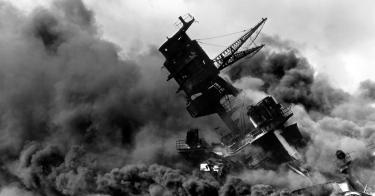Americans have a lot to worry about. Soaring inflation. A pandemic that refuses to go away. Locked-down schools that keep the kids at home while you have to work.
With so much to focus on at home, who has time or energy to pay attention to what’s happening on the other side of the world?
But there’s great danger in becoming indifferent to world affairs. All too often, they wind up crashing into our lives, turning our homes and nation upside down.
We’ve been in this situation before. In the late 1930s, Americans were struggling through the Great Depression. Hitler’s 1938 occupation of the borderlands of Czechoslovakia barely registered in U.S. kitchen-table conversations that year. When he took over Bohemia and Moravia the following year, it was still pretty much crickets on this side of the pond. After all, “that’s their problem; we’ve got worries enough of our own.”
>>> Seven Rules for Exiting Misplaced U.S. and NATO Talks with Russia
The response to events further east was much the same. Japan had seized Manchuria in 1931 and Mongolia in ’36, establishing puppet regimes in both countries. America shrugged. In ’37, Japan invaded China. Few Americans had any idea of where Manchuria or Nanking were, and little interest in finding out.
It wasn’t until Japan struck Pearl Harbor that Americans woke up to the fact that “over there” had suddenly come here.
Once our boys marched off to war, virtually every American family had a map. Tracking the battlefield reports, they could pinpoint places as remote as Palau and Ploesti. What happened in those distant locations would determine when our troops could come home from a war we didn’t ask for but had to fight—and win—to preserve our freedom.
Had the homefront paid that kind of attention to what was going on around the world in the 1930s, the U.S.—in concert with friends and allies—might have been able to forestall Armageddon. Instead, America slept, and the world slipped into chaos.
We can’t afford to make that mistake again. Hostile powers have been on the move for years, meeting with little to no effective resistance from the Western democracies.
Russia’s 2008 invasion of Georgia fractured that country, creating two new puppet states for Putin. In 2014, Moscow invaded and annexed Crimea. Putin has now arrayed 100,000 troops on the Ukranian border, raising the threat of another major invasion of that country. Even more recently, Russian troops have moved into Kazakhstan to help put down a revolt against that nation’s corrupt government.
China, for its part, has been aggressively building and militarizing artificial islands in the South China Sea for years, part of its longstanding campaign to expand its territorial claims. It has effectively taken over the governance of Hong Kong, and now threatens to take Taiwan by military force.
Such hostile actions are not just “someone else’s problem.” They pose a threat to global stability. Left unchecked, they can spin the world out of control again.
The U.S. should not try to be the world’s policeman. But America does need a responsible, practical foreign policy that looks after America’s interests.
To get that kind of policy, everyday Americans are going to have to start thinking about it for themselves. And the first step is to start educating ourselves on world affairs, not ignoring them or just taking as gospel whatever our favorite pundit or politician may say.
>>> Xi Jinping Is About to Cement His Hold on Power in China
That means doing some homework. Nobody likes to do it, but when they do, it can make a huge difference. Look at what happened last year in Virginia. When folks found out about critical race theory and realized it was directly affecting their children, they ignored those who said parents should have no role in curriculum decisions and demanded that schools drop the CRT propaganda.
That same sort of informed activism is needed in American foreign policy. If we can’t muster the effort to think hard about how America should act in the world, then political leaders won’t bother either. They certainly won’t bother to ask us what we think.
We can’t wait for our politicians—or the next Pearl Harbor—to get serious about foreign policy. It’s time to take a good, hard look at what’s going on around the world, and soberly consider the most prudent, effective way to stop current threats from spiraling out of control and, ultimately, landing on our doorstep.
This piece originally appeared in The Sacramento Bee




